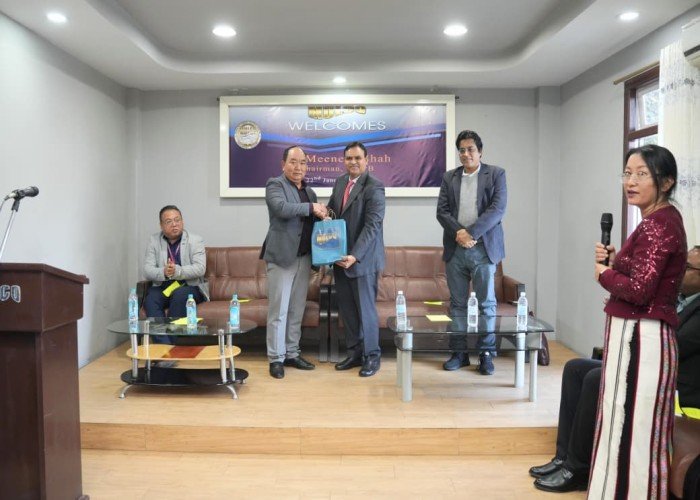To ensure food security needs of the country, the government has been proactively implementing schemes to combat hunger and malnutrition across different demographic segments. These initiatives include national schemes and local efforts targeting vulnerable populations such as low-income families, children, and the elderly. The cooperative sector has been making contributions to ensure this objective is met.
At present, the government is giving shape to the world’s largest grain storage programme which is expected to boost foodgrain production massively. Under the National Food Security Act, there are more than five lakh fair price shops in the country through which subsidised grain is provided to 81 crore people every month. To further boost food security, Annapurti Grain ATM scheme has been started in Odisha. Under this scheme, up to 50 kg of grain can be withdrawn from the ATM machine in five minutes which will ensure that people won’t have to stand in queues for hours. Besides this advantage, this method will also help in reducing wastage.
With the assistance of the central government, Odisha government’s Food Supply Consumer Welfare Ministry of Science & Technology in collaboration with the United Nations World Food Programme has started this initiative.
The grain ATMs will be made available across the state to the beneficiaries 24 hours a day and seven days under the National Food Security Act. Under the current system, the operators of these shops weigh the grain and give it to the customers, which result in many problems for citizens. Primary among them, they have to stand in queues for hours and a lot of grain is wasted as they are scattered during distribution. In contrast, grains can be delivered to the people in an accessible and easy way through the grain ATMs. Any person who has a ration card of the PDS system can avail this facility irrespective of the state or Union Territory he or she belongs to. Up to 50 kgs of grains can be distributed from this machine at any time within five minutes, which will reduce the waiting time of the people by 70 percent. Once the biometric authentication is done, all types of food grains can be taken from it. The modular design of the Annapurna Grain ATM easily fits in the available space and can also be operated via solar panels.
Globally, the Annapurna Grain ATM is being run in many countries. In India, it has been started in Odisha. On the basis of one year of testing, continuous efforts are being made to make it more accessible. In India, the Annapurna machine developed by the World Food Programme has been launched after testing it on many practical aspects. This grain ATM was started in Bhubaneswar, Odisha, so that grain can be made available to the people here 24 hours a day if needed. Before starting the Annapurna Grain ATM, its utility was tested by installing grain ATMs in fair price shops in many provinces. It was operated by the same shopkeepers. The machine will be fully automated and there will be no need to appoint any kind of employees for its operation.
Food storage scheme to be expanded to 11 states
Under the government’s scheme to transform the food storage ecosystem, emphasis is being laid on converting Primary Agricultural Credit Societies (PACS) into multi-state cooperative societies. The government keeps taking review reports from time to time for this project which is slated to start in 11 states. The Union Ministry of Cooperation is executing the plan to build warehouses for food storage in remote Gram Panchayats across the country. The scheme includes states like Uttar Pradesh, Madhya Pradesh, Rajasthan, Gujarat, Maharashtra, Tamil Nadu, Karnataka, Assam, Tripura, Uttarakhand and Telangana. For the implementation of this scheme, the National Level Coordination Committee is working to take the scheme forward at the national level and connect various stakeholders with warehouses in it. In the Food Storage Scheme, an initiative has been taken to build various agricultural infrastructure at the PACS level through various existing schemes of the Government of India such as Agriculture Infrastructure Fund, Agricultural Marketing Infrastructure Scheme, Sub Mission on Agricultural Mechanization – Pradhan Mantri Micro Food Processing Enterprises Scheme etc. This includes warehouses, custom hiring centres, processing units and fair price shops etc.
Salient features
-The pilot project has been implemented in collaboration with National Cooperative Development Corporation (NCDC), NABARD, Food Corporation of India (FCI), Central Warehousing Corporation (CWC) and NABARD Consultancy Services (NABCONS).
-The pilot project is being expanded to 500 additional Primary Agricultural Credit Societies (PACS) in collaboration with State Governments, National Cooperative Consumers Federation of India (NCCF), National Building Construction Corporation (NBCC), etc.
-States and Union Territories and national level cooperative federations such as NCCF and National Agricultural Cooperative Marketing Federation of India Limited (NAFED) have identified additional PACS for creation of storage capacity and other agricultural infrastructure under the project.











